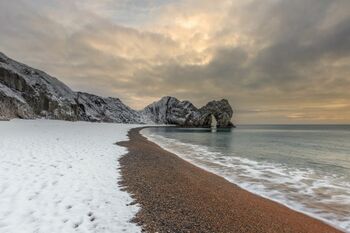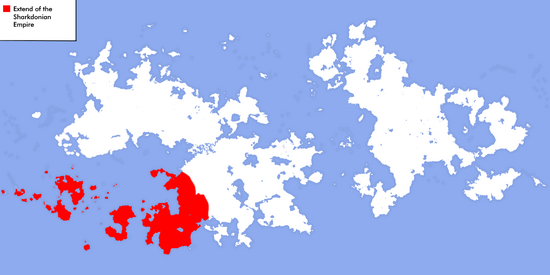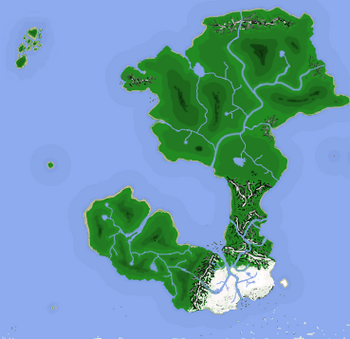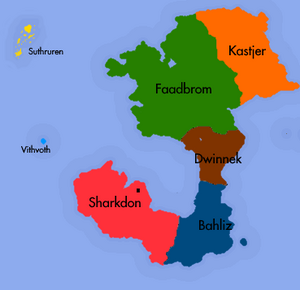Sharkdonia
This article is incomplete because it is pending further input from participants, or it is a work-in-progress by one author. Please comment on this article's talk page to share your input, comments and questions. Note: To contribute to this article, you may need to seek help from the author(s) of this page. |
Autocratic Stratocracy of Sharkdonia | |
|---|---|
|
Flag | |
| Motto: "Ostendit nullum misericordiae!" ("Show no mercy!") | |
| Anthem: National Anthem of Sharkdonia | |
| Capital and largest city | Sharkdon |
| Official languages | Sharkdonese, U.S.E. |
| Religion | Kharistrisismn |
| Demonym(s) | Sharkdonian |
| Government | Autocratic Stratocracy |
• Supreme Leader | Charles Builder IV |
• State-Director | Octavianus Cato |
• Grand Marshal | Julius Hadrianus II |
• Master-Arcarius | Maxentius Radcliff |
• High Emissary | Pierce Flynn |
• Ecclesiarch | Spartacus XVII |
| Legislature | Sharkdonian Senate |
| The High Senate | |
| The National Congress | |
| Area | |
• Total | 1,234,242 km2 (476,544 sq mi) (123) |
• Water (%) | 5% |
| Population | |
• Estimate | 279,000,000 |
• Census | 280,034,261 |
| GDP (PPP) | 2018 estimate |
• Total | 324 trillion |
• Per capita | $187,548 |
| Gini (2018) | 2.4 low (75th) |
| HDI (2018) | medium (281th) |
| Currency | Sharkdonian Dollar (SKD) |
| Time zone | UTC-4 (PT) |
• Summer (DST) | UTC-4 (observed) |
| Driving side | right |
| Calling code | +231 |
| Internet TLD | .shk |
| |
| Periods in the History of Sharkdonia |
|---|
The Autocratic Stratocracy of Sharkdonia, commonly called Sharkdonia, is a country in Atracia, and is an Autocratic Stratocracy made up of 11 states. Besides the 9 mainland states, Sharkdonia owns 2 islands that are officially recognized as states of the Sharkdonian nation. Sharkdonia is one of the larger countries in Atracia. The national capital of Sharkdonia is Sharkdon, the ancient capital of the Red Empire.
Sharkdonia was first inhabited by an ancient sea-faring warrior race, the Oriens Impetu, who were known for their incredible battle might, but most of the time the nation was divided into multiple states busy fighting each other for power and wealth.
Sharkdonia is a developed nation, with a frighteningly high GDP of 311 trillion Sharkdonian Dollars. The per capita GDP of $187,897 ranks very highly in the world, and the nation also ranks high in income equality, with the richest 10% only earning about 2 times more than the poorest 10%. The majority of the economy is led by the humongous Arms/Defense Manufacturing industry, with significant contributions to it from the General Manufacturing industry, as well as Information Technology industry.
Sharkdonia ranks as one of the largest economies in the world, but only average in civil rights and even lower in political freedoms. Sharkdonia is recognized as an emerging power, and is a member of several international organizations, such as the World Assembly.
Etymology
The origin of the word Sharkdonia comes from the original settlers of the area, the Oriens Impetu, a group of ancient sea-faring warrior tribes, whom named the area after the primary god they worshiped, Kharistris. Kharistris was the god of war, honor, and the sea, and was said to resemble a shark. The word eventually evolved into Sharkdonia.
History
Main Articles: History of Sharkdonia, Timeline of Sharkdonian History
Pre-history and early history
It is generally accepted that the first settlers of the Sharkdonian Island were the Oriens Impentu, whom migrated here by crossing the strait between the Atracia mainland and the island using boats about 7,300 years ago; However, newer evidence suggests that they might have actually arrived even earlier than that. After landing on the shores of the island, the first men of Sharkdonia moved westbound, as they were predicted to have landed in the modern day province of Bahliz, which has sub-artic temperatures and surrounded by mountains. The first settlers founded the ancestral and current capital of Sharkdonia, Sharkdon, in about 4300 BCE. Over time, more tribes settled the areas on the Sharkdonia, such as Faadbrom and Dwinnek. The Old Sharkdonian culture and religion was believed to have first appeared around 2720 BCE in Sharkdon, and is considered to be the ancestor of the modern Sharkdonian culture and religion, and it's respecting off-branches.
Overtime, the Old Sharkdonian culture became increasingly complex, and started to develop advanced argriculture, grand architecture, and state-level societies. However, with complexity, came the division among the tribes, ancestors of the Oriens Impentu, and constant fighting with each other was very common. It wasn't until 184 BCE where all of the tribes united and came under one single leader, thus beginning the Imperial Period.
Archaic period and Classical period
During the Archaic and Classical periods of Sharkdonia, which ranged from 1240 BCE to 184 BCE, multiple societal, cultural, and technological advances were developed during this time period. Some of these advances include, but are not limited to:
- The invention of bronze, beginning both the Bronze Age in Sharkdonia
- The invention of iron smelting technolgies, ending the Bronze and beginning the Iron Age in Sharkdonia
- The creation of The Tome of Kharistris, the holy book of Kharistrisisism, believed to have been written by ''The Prophet''.
During the Archaic and Classical periods, 3 kingdoms rose into power within mainland Sharkdonia. Sharkdon, Faadbrom, and Dwinnek. In addition, many small city-states also emerged across Sharkdonia, from the frigid south to the lush forests of the north. These kingdoms and states reached great levels of prosperity that resulted in an unprecedented cultural boom, expressed in architecture, drama, science, mathematics and philosophy. In 508 BC, Aurcrion Staetius instituted the world's first Stratocracy in the city of Sharkdon, capital of the kingdom named after it.
Imperial period (184 BC - 15th century AD)
TBA
word text
word text
words
words
words
words
words
words
words
words
words
words
words
words
words
words
words
words
Colonial Period (15th century AD - 1756)
TBA
Modern Period (1756 - 2000)
TBA
Contemporary Period (2000 - Present)
TBA
Geography and Climate
The land area of the entire Sharkdonian nation is approximately 500,000 square miles (804,672 km2), with the Sharkdonia making up 496,231 square miles (798,604 km2) of that. Sharkdon is the largest state at 247,238 square miles (397,890 km2). The populated island territories of Sharkdonia together cover 9,185 square miles (23,789 km2). Measured by both land and sea area, Sharkdonia is the 2nd largest nation in Anteria.
Sharkdonia comprises of 7 geographical and historical regions - Sharkdon, Faadbrom, Kastjer, Bahliz, Dwinnek, Suthruren, and Vithvoth. Each of these regions occupies a different area on the Sharkdonian mainland. Sharkdon occupies the west, and surrounds the Great Sea, and is famous for its harbors and containing the capital of the Sharkdonian nation, Sharkdon (Region named after the city). Faadbrom occupies the north and is the largest land region of the four. Kastjer occupies the north-east. Bahliz occupies the far south and is the coldest region in the mainland. Dwinnek occupies the middle between both Bahliz and Faadbrom, and is notable for it's vast mineral mines. Suthruren is an island chain located up in the far north-west. Finally, Vithvoth is a tiny island located in the middle of the sea, to the west of Sharkdon.
The coastal areas gives way further inland to the temperate and comfortable Sharkdon and the deciduous forests and the rolling hills of the Faadbrom region. The Ashen Mountains, an extinct volcano, divide the Kastjer region from the Great Sea and both the Sharkdon and Faadbrom region. The cold but strangely beautiful boreal forests of the Bahliz region lie to the south of the other regions, separated by the Southern mountains. Dwinnek with its mountainous regions and its vast resources makes it an industrial powerhouse within Sharkdonia. Suthruren, a beautiful tropical paradise is famous for being one of the biggest vacation spots in the world.
Most of the climate of Sharkdonia is temperate or specifically is oceanic, with generally cool temperatures and plenty of rainfall all year round. The temperature varies with the seasons seldom dropping below −4 °F (−20 °C) or rising above 95 °F (35 °C). Bahliz is subarctic boreal, with cold temperatures almost all year round, and both rains and snows frequently. Higher elevations in Sharkdonia (Excluding Bahliz) experiences a subarctic climate, and the upper mountains experience a Tundra climate. The prevailing wind is from the west and bears frequent spells of mild and wet weather from the Great Sea, although the eastern parts are mostly sheltered from this wind since the majority of the rain falls over the western, northern, and southern regions, the eastern parts are therefore the driest. Ocean currents, warmed by the PLACEHOLDER Stream, bring mild winters; especially in the west and the north where winters are wet and even more so over high ground. Summers are warmest in the east of Sharkdonia, being closest to the Continental mainland, and coldest in the south. Heavy snowfall can occur in winter and early spring on high ground, and occasionally settles to great depth away from the hills.
Demographics
Religion
Religion in Sharkdonia
The largest religion in Sharkdonia is Kharistrisismn, a reformed version of an ancient pagan religion founded in back in the early history of Sharkdonia. Minority religions are also present. Sharkdonians are very religious, with a staggering 97% of the population being adhered to a religious affiliation, and even a surprisingly 17% of the population consider themselves to be a zealot of their religion. Catholicism is the second largest religion in Sharkdonia, with a 11% of the population being christian, most of them immigrants. Minority religions include Buddhism, Hinduism, and Judaism.
Immigration
Immigration is quite common within Sharkdonia, as the nation's policies on immigration is more liberal than other countries. Immigrants make up about 17% of the population. Most of these immigrants are **PLACEHOLDER**
formatting text
Language
As of the 2020 National Census, the primary language in Sharkdonia is Sharkdonese, the native language of Sharkdonians, but the vast majority of the population in Sharkdonia also speak Universal Standard English, or just English for short, as it is the most common language used throughout the world, and it is commonly taught in schools.
Government and Politics
See main articles: Government of Sharkdonia, Sharkdonian Government Organiziations, Sharkdonian Government Departments
Sharkdonia is the world's only surviving stratocracy. It is an autocratic stratocracy, in which absolute rule is dictated by both a single individual and the few with military experience. The government is regulated by a system of checks and balances defined by the Sharkdonian National Charter, which serves as the country's supreme legal document. For 2019, Sharkdonia ranked 131th on the Democracy Index and 138th on the Corruption Perceptions Index.
In the Sharkdonian government system, citizens are usually subject to three levels of government: federal, state, and local. The local government's duties are commonly split between county and municipal governments. Most legislative officials are elected by a plurality vote of citizens by district, but can be appointed by the executive officials. There is no proportional representation at the federal level, and it is rare at lower levels.
The Government is divided into 3 branches
- Legistlative: The Sharkdonian Senate, made up of the 255 member National Congress and the 45 member High Senate, handles the enormous bureaucracy for the administration of the economy and society. They can also, depending on the power granted to them by the current Supreme Leader, adopt federal laws, appoint judges in the First Court, approve treaties, and declare war.
- Executive: The Supreme Leader of Sharkdonia is the absolute ruler of Sharkdonia, and can declare war, draft and adopt laws, appoint members of the Sharkdonian Grand Council, who advises the Supreme Leader and can depose of the current Supreme Leader if needed, and veto any decision made by the Legislation. The Supreme Leader is also the Commander-in-Chief of the Sharkdonian Armed Forces, and almost has complete control over all matters of the government.
- Judicial: The First Court and lower federal courts, whose judges are appointed by the either the Grand Council or the Legistlative branch. The Judicial branch interprets the Sharkdonian National Charter and enforces that all government employees follows it. They have to power to deny any law that they deem unfollowing of the National Charter.
The National Congress has 255 members, each representing a different state district for a 2-year term. Seats in the National Congress are divided among the states by population every 5 years. At the 2015 census, Sharkdon, the most populous state, had 55 congressmen. All territories of Sharkdonia have 1 member on the National Congress. Congressmen are directly elected by their respective provinces.
The High Senate currently has 45 members, with each province receiving 2 members on the Senate at all times. Senators are typically directly elected by their respective provinces, but can be appointed by the Supreme Leader. Senators serve for up to 8 years, before they have to either be reelected or step down.
The Grand Council usually consists of 8 members. The Grand Marshal, the Prime Minister, the Secretary of State, the High Emissary, and the Ecclesiarch all serve on the Grand Council, no matter what. 2 members of the Legislative branch also serve on the Grand Council, and one of the current First Judges also serves on the Grand Council. Additional members can be put into the Grand Council, such as the Princeps-Custodi or the Master of Spies. Members of the Grand Council serve for life.
The Supreme Leader is usually the designated successor of the previous Supreme Leader, which is typically given to their descendants. The Supreme Leader can also be elected by the Grand Council if there is no valid successor to the previous successor. The Supreme Leader serves for life, but can be deposed of the position by the Grand Council or the First Court if they deem that he or she is ineffective as a leader. The traditional dynastic heirs of the Supreme Leadership of Sharkdonia is the Builder Dynasty, who's origins can be traced all the way back to the Imperial period. The current Supreme Leader of Sharkdonia is Charles Builder IV.
Military in the Government
TBA
Elections in Sharkdonia
TBA
Foreign Relations
TBA
Government Finance
TBA
Law Enforcement and Crime
TBA
Military
See main article: Sharkdonian Armed Forces
The president is the commander-in-chief of the country's armed forces and appoints its leaders, the secretary of defense and the Joint Chiefs of Staff. The United States Department of Defense administers the armed forces, including the Army, Marine Corps, Navy, Air Force, and Space Force. The Coast Guard is run by the Department of Homeland Security in peacetime and by the Department of the Navy during times of war. In 2008, the armed forces had 1.4 million personnel on active duty. The Reserves and National Guard brought the total number of troops to 2.3 million. The Department of Defense also employed about 700,000 civilians, not including contractors.[456]
Economy
TBA
Science and Technology
TBA
Income, poverty, and wealth
TBA
Infrastructure
TBA
Transportation
TBA
Energy
TBA
Water supply and sanitation
TBA
Culture
TBA
Food
TBA
Literature, philosophy, and visual art
TBA
Music
TBA
Cinema
TBA
Sports
TBA
Mass Media
TBA
Additional Links
Below is a navbox of all of the major articles relating to Sharkdonia. If anything is missing, please make sure to tell me on the discussion page, it would be greatly appreciated!




